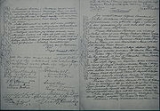
White v Bluett
Encyclopedia
White v Bluett 23 LJ Ex 36 is an English contract law
case, concerning the scope of consideration in English law.
among the children.
Baron Alderson added this.
English contract law
English contract law is a body of law regulating contracts in England and Wales. With its roots in the lex mercatoria and the activism of the judiciary during the industrial revolution, it shares a heritage with countries across the Commonwealth , and the United States...
case, concerning the scope of consideration in English law.
Facts
Mr Bluett had lent his son some money. Mr Bluett died. The executor of Mr Bluett's estate was Mr White. He sued the son to pay back the money. In his defence, the son argued that his father had said the son need not repay if the son would stop complaining about how Mr Bluett would distribute his property in his willWill (law)
A will or testament is a legal declaration by which a person, the testator, names one or more persons to manage his/her estate and provides for the transfer of his/her property at death...
among the children.
Judgment
Pollock CB held there was no consideration for any discharge of the obligation to repay. The sonny had ‘no right to complain’ anyway. Not complaining was therefore an entirely intangible benefit.Baron Alderson added this.
See also
- Bret v JSBret v JSBret v JS & Wife Cro Eliz 756 is a formative English contract law, which held that a good consideration for courts to enforce contracts did not include promises for "natural affection".-Facts:...
(1600) Cro Eliz 756 - Hamer v Sidway (1891) 27 NE 256
- Pitt v PHH Asset Management LtdPitt v PHH Asset Management LtdPitt v PHH Asset Management Ltd [1994] 1 WLR 327 is an English contract law case, which confirmed the enforceability of lockout agreements.-Facts:...
- Williams v Roffey Bros
- Ralli Bros v Walford Lines (1922) 10 Ll L Rep 451, 455, Scrutton LJ said, referring to the decision below,
I myself do not desire to say more than that I feel very great difficulty in accepting that. I do not myself see how to fit in that decision with the decision of the Court of ExchequerCourt of ExchequerCourt of Exchequer may refer to:*Exchequer of Pleas, an ancient English court, that ceased to exist independently in the late nineteenth century...
in White v Bluett where a son alleged his father had agreed with him to discharge a bill if the son would stop complaining of the distribution that his father had made of his property; and it was held that such a consideration as that the son would not continue to bore his father with complaints would not support a binding contract: there being as I gather in the view of the Court of Exchequer no giving up of a claim which could possibly be put forward. It is quite true that some of she language in White v Bluett does not seem to fit in with the later cases: for instance Chief Baron Pollock says:—
The son had no right to complain, for the father might make what distribution of his property he liked; and the son's abstaining from doing what he had no right to do can be no consideration.
That language, if strictly applied, would shut out compromised claims, though honestly made but in fact ill-founded, which I do not think Baron Pollock intended to do. But I feel much difficulty in saying that the peace and quietness obtained by a man stopping talking, although he is not binding himself to give up a claim in the future is sufficient consideration that on this matter I should not be able to differ from the judgment of the Judge below.

